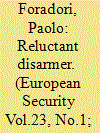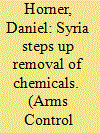|
|
|
Sort Order |
|
|
|
Items / Page
|
|
|
|
|
|
|
| Srl | Item |
| 1 |
ID:
127825


|
|
|
|
|
| Publication |
2014.
|
| Summary/Abstract |
Of the five North Atlantic Treaty Organization (NATO) European countries of US nuclear forward deployment, Italy is the least-known and studied case, even though the country hosts the largest number of US nonstrategic nuclear weapons (NSNWs) and still has two bases of deployment. The paper aims at filling this gap by analyzing Italy's current view on the presence, value, and future of NSNWs hosted on its territory. The analysis begins with the examination of the process of profound devaluation that has minimized, starting from the end of the cold war, Italy's original interest in this category of weapons. It then examines the reasons why Rome continues to pursue conservative nuclear weapon policies and distances itself significantly from the progressive camp of NATO members, particularly Germany, that explicitly call for the withdrawal of US NSNWs from Europe. Through the study of the Italian domestic politics and security culture, the article explains Italy's opposition to any radical change in the NATO nuclear status quo, and its reluctance to pursue policies that are consistent with the process of nuclear devaluation that the country has experienced over the past two decades.
|
|
|
|
|
|
|
|
|
|
|
|
|
|
|
|
| 2 |
ID:
128056


|
|
|
|
|
| Publication |
2013.
|
| Summary/Abstract |
Preventing further use of chemical weapons in Syria will be achieved by their elimination rather than punitive airstrikes. Selective airstrikes, as repeatedly threatened by France, the United Kingdom, and the United States, would not have altered the military situation in the civil war, as the Syrian opposition forces and their backers had hoped.The airstrikes would most certainly not have degraded Syria's chemical weapons capacity to the point it would have become useless, and further chemical attacks would have remained a distinct possibility. Targeting chemical weapons storage sites risked releasing toxic clouds affecting combatants and noncombatants alike. Destroying other types of targets would have just added to the tally of conventional weapons casualties
|
|
|
|
|
|
|
|
|
|
|
|
|
|
|
|
| 3 |
ID:
130372


|
|
|
|
|
| Publication |
2014.
|
| Summary/Abstract |
Syria has picked up the pace in removing its chemical weapons materials for overseas destruction and has sent about half of its stockpile out of the country, according to figures in a March 20 press release from the Organisation for the Prohibition of Chemical Weapons (OPCW). Syria had been under broad international pressure to speed up the effort. By the end of February, it had made four shipments, removing about 5 percent of its so-called Priority 1 chemicals and about 20 percent of the Priority 2 chemicals. Citing those figures, Robert Mikulak, the U.S. ambassador to the OPCW, had accused Syria of "continu[ing] to drag its feet." (See ACT, March 2014.) Under a schedule set last November by the OPCW Executive Council, the Priority 1 materials were supposed to leave the country by Dec. 31. All other materials that are part of the overseas destruction program were to leave by Feb. 5. The rest of the approximately 1,300 metric tons of chemical agents that Syria declared is to be destroyed within the country. The removal dates were set with an eye to a June 30 deadline for destruction of the chemical agents, which was established last September by the Executive Council and the UN Security Council. (See ACT, October 2013.)
|
|
|
|
|
|
|
|
|
|
|
|
|
|
|
|
|
|
|
|
|